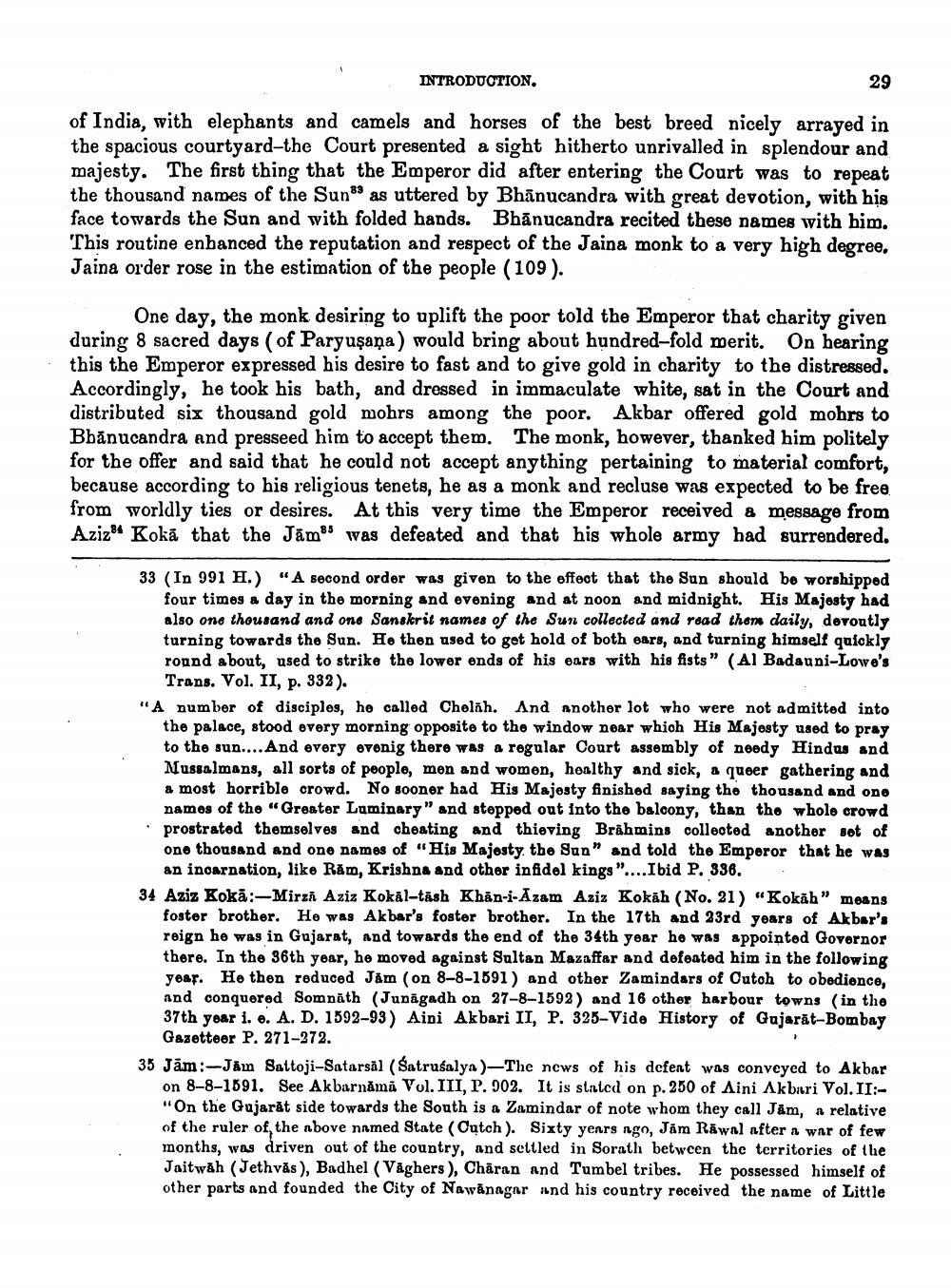________________
INTRODUCTION.
29
of India, with elephants and camels and horses of the best breed nicely arrayed in the spacious courtyard-the Court presented a sight hitherto unrivalled in splendour and majesty. The first thing that the Emperor did after entering the Court was to repeat the thousand names of the Sun' as uttered by Bhānucandra with great devotion, with his face towards the Sun and with folded hands. Bhānucandra recited these names with him. This routine enhanced the reputation and respect of the Jaina monk to a very high degree. Jaina order rose in the estimation of the people (109).
One day, the monk desiring to uplift the poor told the Emperor that charity given during 8 sacred days of Paryuşaņa) would bring about hundred-fold merit. On hearing this the Emperor expressed his desire to fast and to give gold in charity to the distressed. Accordingly, he took his bath, and dressed in immaculate white, sat in the Court and distributed six thousand gold mohrs among the poor. Akbar offered gold mohrs to Bbănucandra and presseed him to accept them. The monk, however, thanked him politely for the offer and said that he could not accept anything pertaining to material comfort, because according to his religious tenets, he as a monk and recluse was expected to be free from worldly ties or desires. At this very time the Emperor received a message from Azizet Kokā that the Jāms was defeated and that his whole army had surrendered.
33 (In 991 H.) "A second order was given to the effect that the Sun should be worshipped
four times a day in the morning and evening and at noon and midnight. His Majesty had also one thousand and ono Sanskrit names of the Sun collected and read them daily, devoutly turning towards the Sun. He then used to get hold of both ears, and turning himself quickly round about, used to strike the lower ends of his ears with his fists” (Al Badauni-Lowe's
Trans. Vol. II, p. 332). "A number of disciples, he called Chelāh. And another lot who were not admitted into
the palace, stood overy morning opposite to the window near which His Majesty used to pray to the sun.... And every evenig there was a regular Court assembly of needy Hindus and Mussalmans, all sorts of people, men and women, healthy and sick, & quoer gathering and a most horrible crowd. No sooner had His Majesty finished saying the thousand and one names of the “Greater Laminary" and stepped out into the balcony, than the whole crowd prostrated themselves and cheating and thieving Brahmins collected another set of one thousand and one names of "His Majesty the Sun" and told the Emperor that he was
an incarnation, like Răm, Krishna and other infidel kings"....Ibid P. 336. 34 Aziz Kokā:-Mirza Aziz Kokāl-tash Khan-i-Azam Aziz Kokāh (No. 21) "Kokāb" means
foster brother. He was Akbar's foster brother. In the 17th and 23rd years of Akbar's reign he was in Gujarat, and towards the end of the 34th year he was appointed Governor there. In the 36th year, he moved against Sultan Mazaffar and defeated him in the following year. He then reduced Jåm (on 8-8-1591) and other Zamindars of Outch to obedience, and conquered Somnāth (Junagadh on 27-8-1592) and 16 other barbour towns (in the 37th year i. e. A. D. 1592-93) Aini Akbari II, P. 325-Vide History of Gujarăt-Bombay
Gazetteer P. 271-272. 35 Jām:-Jäin Sattoji-Satarsal (Satrusalya )-The news of his defeat was conveyed to Akbar
on 8-8-1891. See Akbarnămă Vol. III, P. 902. It is stated on p. 250 of Aini Akbari Vol. II:"On the Gujarat side towards the South is a Zamindar of note whom they call Jäm, a relative of the ruler of the nbove named State (Outch). Sixty years ngo, Jam Rāwal after a war of few months, was driven out of the country, and settled in Sorath between the territories of the Jaitwah (Jethvås), Badhel (Våghers), Charan and Tumbel tribes. He possessed himself of other parts and founded the City of Nawānager and his country received the name of Little




